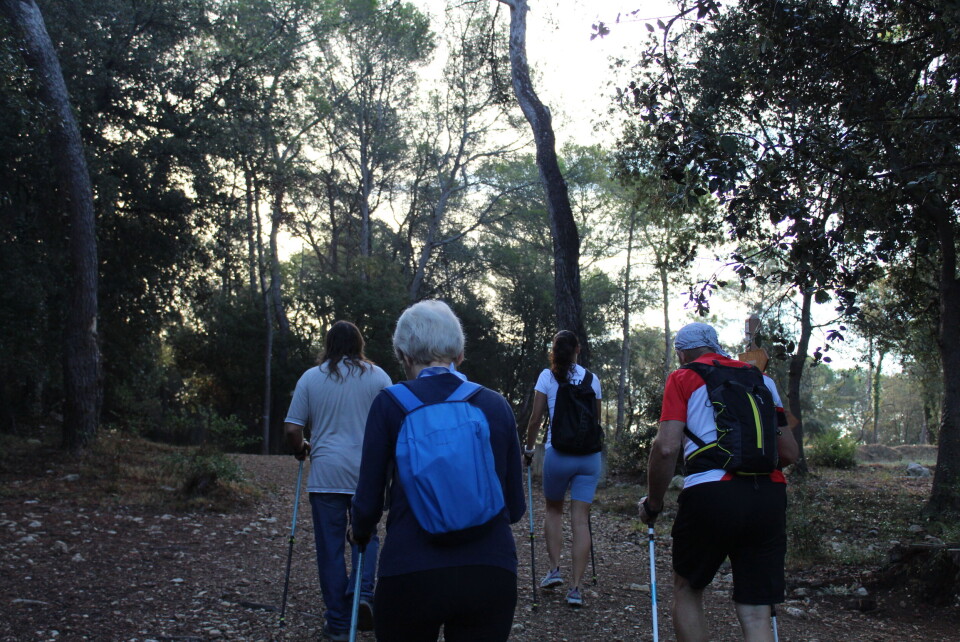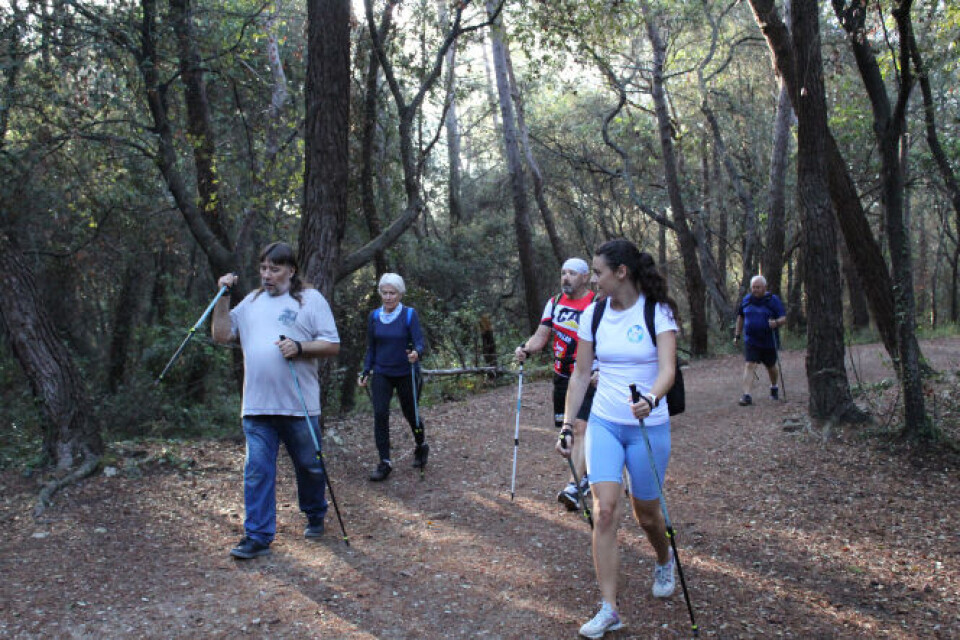-
‘Medical deserts’ major issue in upcoming local elections in France
Access to healthcare is now a more pressing concern than education, mayors say
-
How to save money on seeing a specialist doctor in France
Some specialists charge more than others for the same service
-
Thermal cure funding confirmed in France for 2026
Cure thermale is a prescribed medical treatment using fresh spring water in an approved centre
Walking group helps French heart patients live a normal life again
In Mougins, heart patients meet weekly for a free Nordic walking class as part of an experiment into physical activity on prescription. The Connexion tagged along

“This is the life. It’s better out here than in the gym.”
Eric Marcq, 56, takes a breath of crisp morning air. Every Thursday since mid-June, he has come to this lake in Mougins (Alpes-Maritimes) for a spot of Nordic walking.
The group sessions are part of the ‘As du Coeur’ programme, testing free five-month exercise regimes for people who recently suffered from serious heart problems.
The classes follow on from the three-week cardiac rehabilitation patients already receive.
Every week, the group has one hour of Nordic walking and one session in the gym.
Read more: Heart disease patients in France prescribed free sports classes
After spending the first few weeks walking around the lake, today the group is heading into the forest in search of hills to increase the difficulty.
‘You would never believe we were operated on two or three months ago’

“You would never believe we were operated on two or three months ago,” says former lorry driver Francis Bozzano.
Although he had no symptoms and had an active lifestyle, after Mr Bozzano was encouraged by his doctor to see a cardiologist, he learned he was suffering from aortic dilation.
His aorta had expanded and was at risk of rupturing.
He underwent open-heart surgery, after which he began suffering from arrhythmia, requiring two cardioversions – electrical shocks to restore a regular heart rhythm – and ablation surgery.
“Eleven days later, I could walk across my room. I asked the nurse to help me up so I could walk to the window. When I got back, I sat on the bed and cried like a fountain.”
Today’s activities are led by Marie-Line Alemany of Vitae Sport Santé, one of 436 Maisons Sport-Santé set up from 2019 to provide equal access to the health benefits of physical activity.
Read more: Older people should be prescribed free sport says French minister
The walking is broken up by different exercises, including using a park bench to perform step-ups. The idea is to show the group workouts they can replicate themselves without expensive equipment.
Mr Bozzano also enjoys cycling long distances, but he believes the programme has helped his physical recovery.
‘We work the muscles we don’t normally use’
“We work the muscles we don’t normally use,” he says. He has started coming to the lake on Sunday mornings for more Nordic walking. “I even bought the poles.”
Read more: Mayors ban pointed walking poles on fragile French coastal paths
Former lawyer Marie-Christine Ferry, 75, was also active before being diagnosed with coronary artery spasm, which caused her to experience sporadic chest pains.
“I would do long hikes, but only once every one or two weeks. I’ve learned it’s better to do less, but regularly,” she says. The positive dynamic within the group has helped both her physical and mental recovery.
“It allows you to regain confidence in the possibility of living a normal life. Before, I didn’t dare sing, go hiking, do anything, I was afraid of having an attack. Now I’ve learned to manage it.
“I’m now looking for groups to do Nordic walking as well as hiking. I don’t know if I would have done it if I’d had to pay.” For others, the prescription was the push they needed to get back into the rhythm of regular exercise. That was the case for René Malegue, 69, who had surgery in March.
“For four months before that, I wasn’t supposed to exercise, as I risked sudden death.
“I’m really happy this exists, because I know myself, I would have done nothing. I struggle to take it upon myself and go walking alone. Here, there’s a programme, we start slowly and do different exercises.”
At the end of the hour, the group stretch out their calves, while Mr Bozzano makes sure they are doing it properly. “I’m watching!” he says.
‘We have a good laugh’

“We have a good laugh,” Ms Ferry says.
“That’s very important. It helps to make what we’re living through feel less dramatic.”
Ms Alemany adds: “They forge ties. In their hardship, there is a team spirit, as they’ve all experienced the same thing.”
Of the three groups she began with, two have come to the end of the five months.
During their final evaluation, out of 20 participants, just two said they would not have followed the programme if the cost had not been reimbursed.
Whether or not this is true, what is certain is the positive atmosphere in Ms Alemany’s classes. Many expressed a wish not just to continue their physical activity, but to continue under her supervision.
“I created a class just for them. We start next week. Out of 20, 10 have already signed up, and others are a maybe.”
Nine health centres from five regions were chosen to participate in the experiment, which could be extended to the rest of France if the results are positive.
Related links
How to join a sports club in France: admin, medical fees explained
French Doctolib platform accused of promoting alternative medicine
French emergency services: Why it is now harder to reach 15 number
























